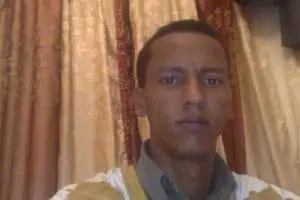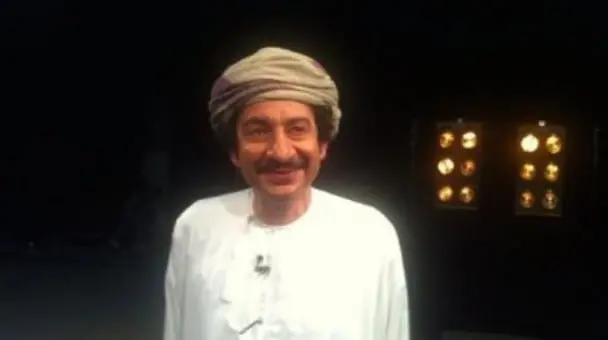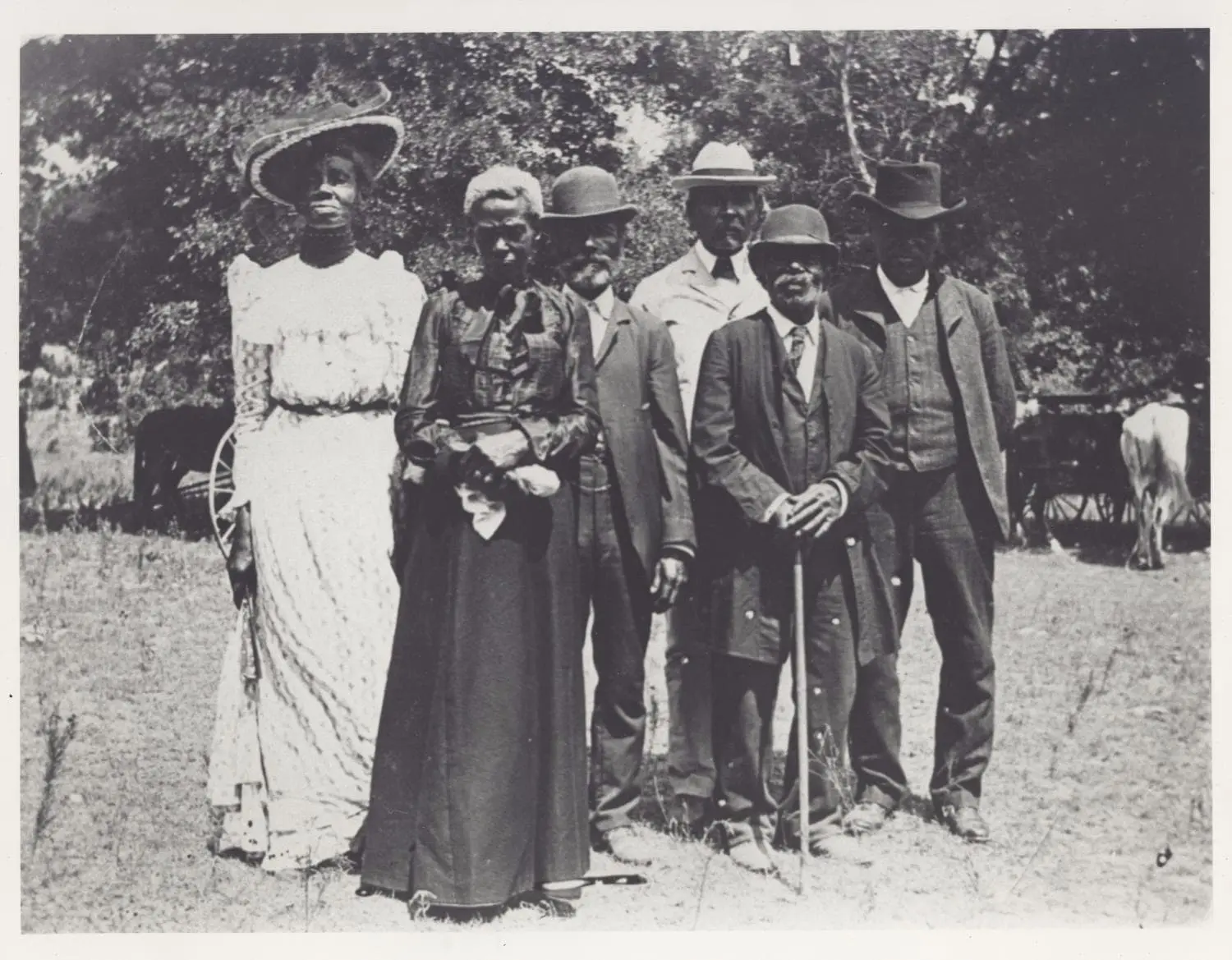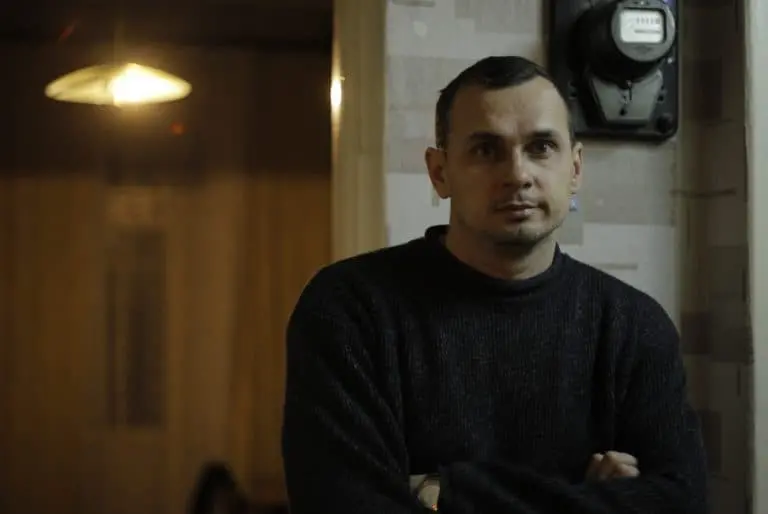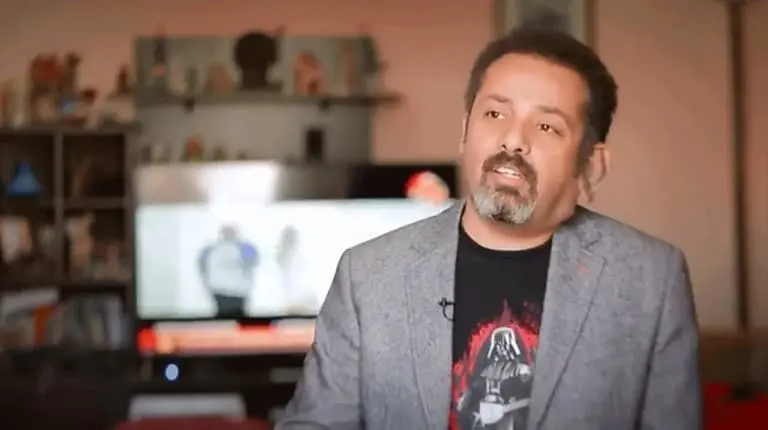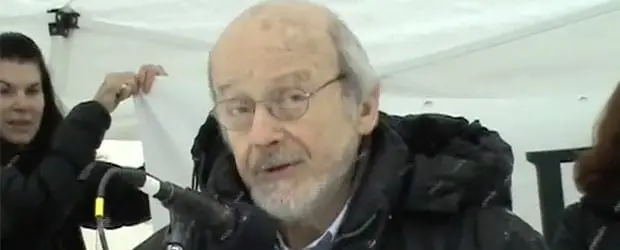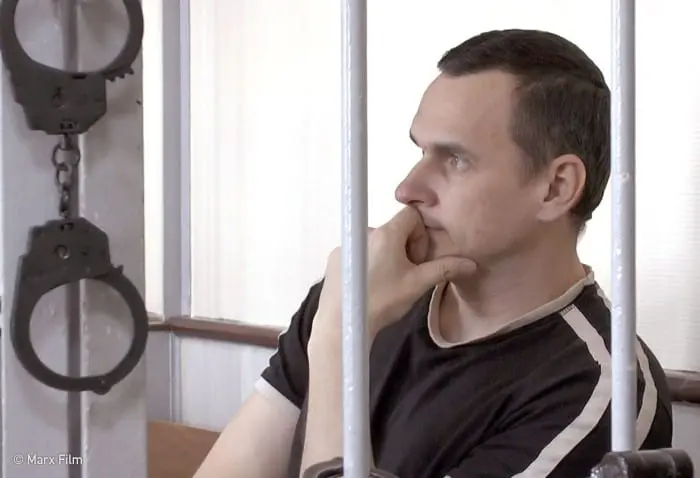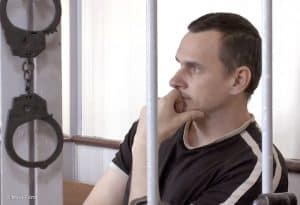 PEN America features a series of short stories by Ukrainian writer and filmmaker Oleg Sentsov who was sentenced to 20 years in a Siberian prison in August 2015 on trumped up charges of terrorism after being a vocal opponent of the Russian annexation of Crimea. He has been on hunger strike for a second month now to urge the Russian authorities to release all Ukrainians unfairly imprisoned in Russia. PEN America is calling for his immediate release.
PEN America features a series of short stories by Ukrainian writer and filmmaker Oleg Sentsov who was sentenced to 20 years in a Siberian prison in August 2015 on trumped up charges of terrorism after being a vocal opponent of the Russian annexation of Crimea. He has been on hunger strike for a second month now to urge the Russian authorities to release all Ukrainians unfairly imprisoned in Russia. PEN America is calling for his immediate release.
“Dog”
When I was a child I wanted to have a dog. A German shepherd. Definitely a German shepherd. I saw them a lot in movies, and there were a couple in our Village. I wanted my own. To take it for walks, to train it. To walk along the street and have everyone look at me. I wanted it to obey me, I wanted us to love each other.
I had already had a dog before. It was more of a family dog, not really mine. It had an entirely unheroic name—Tuzik. He was a black mongrel, medium sized, who one day just wandered into our yard. Tuz (as I called him, to make him seem a bit more serious, mostly in my own eyes) had clearly had a rough time—you could tell he’d been beaten and abused plenty. His first week with us he spent inside his kennel and didn’t come out even to eat. He was so happy that nobody was hurting him, and he just preferred peace and quiet.
But later Tuzik got used to us, we all grew to love him; I was about nine or ten years old then. I took him for walks in the forest, in the fields. I walked him on a rope. At home he was chained up, but at night we let him go, and he ran around the garden or even in the street and didn’t bother anybody. He was really smart, obedient, and good-natured. But his past life had left a mark on him. They say that people’s life experience can be read in their faces. It’s true. And dog’s lives can also be read in their eyes. That black mongrel’s eyes were sad for good.
A few years passed, and one ordinary morning my mum woke me up, sat on the edge of my bed, and told me that Tuzik had been killed. They were going around shooting stray dogs, and they had shot him, early in the morning, in the street right by the gates to his house. My mum suggested I should cry a bit, it would make me feel better, but I couldn’t. I couldn’t believe it. No, I knew that he’d been shot, but somehow I neither believed it nor understood it.
That’s how it always is. Some time always has to pass between the moment when you’re told that a loved one has died and the moment when you understand it and feel the loss. It’s happened to me a few times. When I turned 20, a man came and told me that my father had died, and the first sensation I had, which filled up my entire mind, was “it’s not possible.” And even an hour later, when I saw him lying there as though he were asleep, I didn’t feel the loss. And when they carried him out of the house in his coffin the next day, somewhere I felt a sharp pain, but there was no all-consuming grief. The next time I felt the dull pain was when a man at the cemetery, after telling the family to say goodbye to the deceased, gave the instruction to close the coffin, and they began to hammer, with dull, very dull blows, on the lid, in which they’d already stuck the nails in preparation. In the deep grave, the gravediggers had left an empty bottle that they’d drunk, discarded and forgotten.
It felt like everything was happening in a cotton-wool dream. Like it’s not happening to you. The wake at the workers’ canteen, the vodka that doesn’t make you drunk, and all those people, random or sympathetic observers, and all sorts of relatives.
And then, late in the evening, when everything had calmed down, when only close family were left in the house, when the cleaning up had been finished and we were getting ready for bed after the hard day, in a quiet place on the veranda, in the darkness, beyond the edge of the circle of light drawn by the street lamp in the yard, I sat down on a small, portable bench. I was very tired and sat in silence, staring into the darkness. And then I understood that I was sitting in the very place where my father used to like to sit. I was sitting on his favorite bench, which he had made himself. And then I distinctly and clearly understood that he was gone. I felt it physically—there’s his place, there’s his bench, but he’s gone, and he’s never coming back. It was frightening to feel this emptiness, this blackness. And I started to cry, quietly, slowly, barely making a sound. My eight-year-old nephew was standing nearby and noticed that I was crying. He tried to comfort me, like kids do—he started stroking my head. Also without making a sound. And so I sat on the bench, with my head bowed, silently crying, and he stood next to me and silently stroked my head.
After Tuzik died, almost a year passed, and I persuaded my parents to get me a new dog. A German shepherd! For my 12th birthday, my dad and I went into town and bought a puppy at the animal market, a mix between a German shepherd and a Caucasian shepherd dog. The puppy was tiny, just over a week old, he could barely crawl and he barely ate anything, and he could fit easily on my childish palm; he had no breed registration documents, but he only cost 15 roubles. At night, he squealed and crawled all over my bedroom floor, until my mum had had enough and came and put him in my bed, where he warmed himself up and fell asleep. At first, I fed the puppy by dipping my finger in milk and sticking it in his mouth, as he still hadn’t learned to lap up the milk. We called the little guy Dick.
The dog grew quickly. He was strong, shaggy and clumsy, and, like all puppies, loved to play. When Dick grew up, I was a bit disappointed: A mongrel is a mongrel, and although they cross German shepherds with Caucasians to try and get the best of both breeds, my dog didn’t look like any of the pictures in the little book on dogs that I’d once borrowed. For a while it really bothered me, but eventually my love for the dog overcame my consciousness of his imperfections.
My dog grew up big and strong. His reddish-black coat made him look more like a German shepherd, but his big bones were unmistakably Caucasian, as were his ears, which drooped at the ends, and his slightly curly tail. Dick grew very attached to me, and I to him. We walked a lot, and I trained him—he learned to do quite a few things that a working dog should be able to do. Although, at the same time, he had a rather wayward character. His hunting instinct would always come through whenever he saw a chicken, a duck, or similar prey, which led to innumerable conflicts with the owners of such ravaged beasts, including with my own parents.
I usually took Dick to the forest that grew near our Village, on the other side of the field, up the hill. We would walk alone, or sometimes with my friends, who brought their own dogs—though none of them was as beautiful as mine. It was fun to hang out with the others, but I preferred walking alone in the forest with my dog. They were unforgettable moments. When he searches for you, after you’ve deliberately stayed behind a bit and hidden in the bushes. He searches for you and finds you. And how happy you are when you find each other again after such a brief parting! The dog is happy that he found his master, and the master is happy that he has such a clever dog, and you’re both happy because you love each other and you’re together again. Or how exciting it is when you come across a hare that sits quietly until the last moment and then shoots away from under your very feet, and you watch your seemingly unwieldy dog suddenly turn into an arrow, flattening his ears, and, squealing a bit, rushing after the animal, and gradually losing ground.
How beautiful it is to walk on a damp autumn day, in the long, bright twilight, when there’s nobody around; it smells of rotting wood, and there’s a light haze in the air.
Winter is also good for walking, when snow, so rare in our parts, falls, when you see footprints, your own and those of others, when your voice rings out and carries itself far into the distance, when you shout with all your might: “Dick, come here!” and then you hear the beating of his paws, followed by his breathing, and then you see your dog running toward you, knocking snow onto himself from the lower branches. And on a summer evening, how wonderful it is to return from a walk when the air is full of sound and it smells of a downpour that hasn’t yet happened, and when you come out of the forest you suddenly become aware that the whisper of the leaves is much too loud, and you realize that it’s rain, that it has started and is following you through the forest. And you start running as fast as you can down through the field, and your dog runs with you, turning his head toward you, and halfway home the rain catches you. And then you walk home together, and you take him on his leash, and all the dogs on the street go crazy, and yours answers with his own thunderous bark, and you can barely hold him back, and you are both tired and happy. Then you give him some water, you pour it from the jug into his bowl, and then you bring him his supper. You both fall asleep happy. And next morning you go to school, and the dog, dragging his chain, follows you to the gate, and you both know that in the evening there’ll be another walk, and you’ll be together again, and you’ll be happy again.
Childhood is a happy time. Thank God I had a happy childhood, in which the warmest and most cherished moments are those spent walking my dog.
But then childhood gradually finished, and walking the dog turned into a tiresome obligation, or an excuse to go and have a smoke or play cards with the guys in the forest. In summer, I dedicated more evenings to my friends and to football than to walking my dog. And every time he saw me approaching the gates, Dick would jump out of his kennel with hope in his eyes that we would go for a walk, but almost every time he was disappointed. At first, I always stopped, stroked him, apologized that we wouldn’t be going for a walk that day, and he would lick my face, and we’d part. Later, I would give him a quick pat on the head before going out, and later still I would just walk right past him. The further I progressed through school, the rarer our walks became, the less time I dedicated to my dog, and soon the walks stopped entirely. I found new interests, new friends, and the dog faded into the background, like a wife that you continue to live with but stop noticing.
Later, when I’d finished school, I went to study in the City and only saw Dick once a week. I would stroke him when I arrived, sometimes when I was leaving. Did I still love him? Of course I did, but that love had already turned into a habit, like the way you love old people. Dick was already 10 years old by then, and he’d started to age. Did he still love me the way he had before? I think so. It had been my mum who had looked after him in those later years—fed him and let him out for the night into the yard or the street—but all the same, a dog only chooses one master, and stays faithful to him until the end. Dick started to get sick, then his back legs started to buckle under him; he’d rarely get up; he had rheumatism. My family was able to fight the illness (which, by the way, I suffered from myself as a child), and we started to inject him with the necessary medicine. Dick improved, gained strength, and he managed to keep going for another year and a half.
He died a long and painful death. While we were trying to decide whether to put him to sleep or not, it all finished. I came back from the City, put him in a large box and dragged him off on a metal trolley to bury him. In his old age, Dick had dried up and shrunk to about half his original size, but all the same he was pretty heavy.
I buried him myself on some waste ground that was slowly turning into a rubbish dump, next to the road that leads to the forest—the same one we used to like to walk along. I dug a hole, put the dog in it and began to bury him. I had nothing to cover him with, and, after my first spadeful of earth landed on the dog’s muzzle, I stopped. It was hard. I couldn’t do it. After the second spadeful, tears welled up in my eyes. When the earth closed up over the dog, then it got easier. I would never have thought that it would be harder to bury my dog than my father.
They say that there’s no such thing as bad people, only bad deeds. That’s true. There is at least a bit of goodness in every person. It’s called kindness. And the kinder a person is, the better. All this kindness is instilled in us in childhood. It’s in the gentleness of our mothers and the hands of our fathers, it’s in our friends, it’s in fairy tales and books. It’s in the cartoons we watch. In the little mammoth swimming toward his mum in the ice floe there’s more kindness than in all the charitable organizations put together! And kindness is also love. And not only love for your parents, for your kith and kin, but also for animals. Especially domestic animals, especially your pets.
And the best thing of all is to love a dog, and to have the dog love you. Cats and especially parrots—they are incapable of love. They’re capable of living, for sure, but not of loving. Love for a dog is the closest thing there is to love for a woman. Your mum can love you, but she also has to love your dad, your brothers and sisters, her own mother and father, and maybe also your neighbor, Uncle Petya, though that’s none of our business . . . But a dog will love only you and will be devoted only to you. And it asks for nothing in return. Apart from your love.
God, how I want to look into those eyes just one more time.

